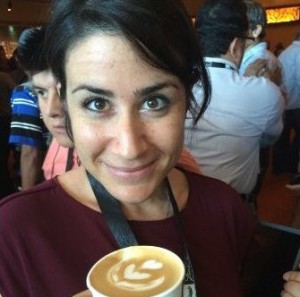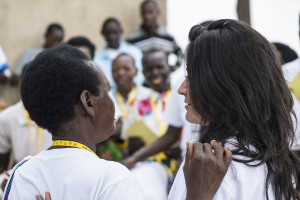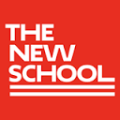 Ashlee Tuttleman is a 2012 graduate of the M.A program in International Affairs at The New School. She has extensive experience in East Africa working in product and program development, supply chains and human-centered design. Prior to Milano, Ashlee worked in the private sector for eight years in organizational change management, project management and marketing. Most recently, Ashlee became the Social Enterprise Project Manager at Sustainable Harvest Rwanda, where she designs and implements social impact programs that improve information exchange among coffee origins and along the coffee supply chain. Programs she designs reinvest premiums earned through coffee processing back to the farmers.
Ashlee Tuttleman is a 2012 graduate of the M.A program in International Affairs at The New School. She has extensive experience in East Africa working in product and program development, supply chains and human-centered design. Prior to Milano, Ashlee worked in the private sector for eight years in organizational change management, project management and marketing. Most recently, Ashlee became the Social Enterprise Project Manager at Sustainable Harvest Rwanda, where she designs and implements social impact programs that improve information exchange among coffee origins and along the coffee supply chain. Programs she designs reinvest premiums earned through coffee processing back to the farmers.
Want to be part of this series? Shoot us an email at [email protected].
Can you provide an example demonstrating how Sustainable Harvest’s work increases profits to coffee farmers?
I’ll use an example from Nyaruguru in southern Rwanda. The Nyampinga Cooperative (meaning: beautiful, intelligent and respectable in Kinyarwanda) is made up of 56 women who were subsistence farmers with just a few coffee trees on their land. Through the first year of our agronomy training program, which follows the annual coffee harvest cycle, we taught the women how to apply best practices to improve the productivity and quality of their coffee production so their coffee reaches specialty grade, which earns farmers more per kilogram than commodity coffee. When it came time to deliver their ripened cherries to a local coffee washing station (CWS), we facilitated the direct negotiation between the CWS management and Nyampinga so their cherries would be separated from all the other deliveries throughout the washing process, and so they could guarantee the price for their cherries. This is meaningful because Nyampinga delivered higher quality cherries than other cooperatives and individuals, translating to higher prices for their production. If their cherries were mixed, Nyampinga would earn commodity coffee prices. During the 2014 harvest, Nyampinga earned roughly 20% more for their specialty cherries than their counterparts delivering commodity grade cherries- and that was only after their first year in our program and doesn’t account for increases in yield that stem from practice improvements. The practice of separating cherries also supports greater traceability and transparency for coffee buyers so they know more about its origin.
Moreover, Sustainable Harvest’s transparent engagement with Nyampinga and other stakeholders such as local government, made possible by funding and support from Bloomberg Philanthropies, led to the construction of a new CWS that will be managed by the Cooperative, meaning that Nyampinga members will graduate from smallholder farming to enter coffee processing, managing one of the most important coffee processing links in the value chain and retaining the earnings from this value-adding activity.
Let’s Talk Coffee is Sustainable Harvest’s platform for information exchange and transparency along the supply chain. Annual global and regional events called Let’s Talk Coffee brings everyone in coffee together, from producers to roasters to NGO partners and financial institutions. The events are continuous opportunities to problem solve, share information, make deals and most importantly, build relationships with other supply chain partners. Let’s Talk Coffee is the only mainstream coffee event whose attendees are 60% coffee producers.

What major challenges do coffee growers face in the coffee supply chain?
Sustainable Harvest Rwanda recruits women farmers from very poor regions in the country where illiteracy and innumeracy is widespread, especially among the older generation. While I can’t speak on behalf of women about what they personally identify as their biggest challenges, I can confidently say that before Sustainable Harvest Rwanda came into the picture, opaque supply chains and actors within those chains create considerable challenges to the women. Without knowledge about prices, risk, demand and the resources that are available, coffee growers fail to reach their potential. Poor access to finance can also be prohibitive for our coffee growers and CWS owners in Rwanda.
You presented your work at the New School in November 2014 and mentioned that technological innovations are being used to support Sustainable Harvest’s work on the ground. In what ways are technological innovations increasing Sustainable Harvest’s impact?
Training materials, logistics and traceability tools, and quality and flavor applications are all in-house innovations developed by Sustainable Harvest. In the field, our agronomists often use short videos and pictures as educational platforms shown on their iPads to bring a training or technique to life. Even if the best practice captured in the video is recorded in another country via what we call Origin Exchange, we translate that recording into several languages (primarily English, Spanish, Portuguese, Swahili and Kinyarwanda) to scale the learning potential of a single lesson in a single location.
The Relationship Information Tracking System for Producers (RITS Producers) is a mobile application that farmers who manage coffee washing stations use to improve efficiency and communication on the ground. It tracks coffee through each step of processing, enabling greater transparency and traceability for all supply chain actors. Because of RITS, farmers can ensure the availability of their highest quality coffees and identify opportunities for quality improvement.
Most recently Sustainable Harvest set out to create an application that would develop a common language around taste, called Tastify. In specialty coffee especially, the “flavor profile” of coffee is extremely important because roasters and their buyers often know exactly what flavors they’re looking for. With an application like Tastify, roasters can search for familiar flavor profiles and discover entirely new regions (and farmers) that match their needs.
Many Milano students hope to live and work with communities and cultures that may be new to them. What advice would you give to those considering embarking on this experience for the first time?
Practice empathy. If you’re in a new place with new people who are part of a different culture from your own, try not to jump to conclusions. It takes a long time to understand other people’s motivations, perspectives, and ways of doing things. Expect frustration and misunderstanding. Expect to be insulted and confused. But expect that the people around you are feeling the same things about you. Sometimes you can’t just talk it all through with someone – sometimes you just have to be patient and attentive. For me, the best way I did this was not to hide away in the expat scene but to dive into local environments, scenes and people. It’s easy in many places to retreat to what you know, but it definitely won’t be as satisfying. That said, many people need a balance and hanging out with other expats is a great way to blow off some steam in a safe environment. It can feel like a quick trip home, which your heart and soul might need.
I think another important point is that if you’re not cut out to live as an expat in another place with different people, that’s OK. You’re not failing – you’re being true to yourself. If it doesn’t feel right for you and you just want to go home, then do it. Be true to yourself because if you’re not happy, people know, and you’re not making the impact you’re trying to make anyway.
When thinking back on your time at Milano what experience(s) do you often draw on in your day-to-day life?
I think about the awesome cohort I came from – the people who inspired me and continue to do so. Some of the people I met in Milano are still great friends doing amazing things, from working at the United Nations as analysts to reporting on the conflict in neighboring Democratic Republic of Congo to supporting think tank research about microfinance around the world. These people are still great friends and serve as a fantastic professional network.



